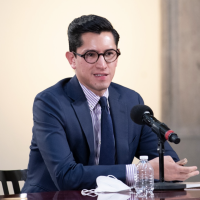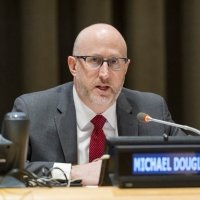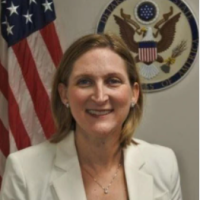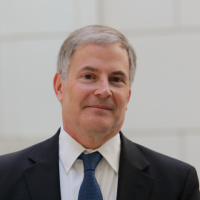Furthering North American Collaboration
The Wilson Center's Mexico Institute and Canada Institute hosted a conversation on the future of U.S.-Mexico-Canada relations with Roberto Velasco Álvarez, Chief Officer for North America for Mexico’s Secretariat of Foreign Affairs, Michael Grant, Assistant Deputy Minister for the Americas for Global Affairs Canada, and Rachel M. Poynter, Deputy Assistant Secretary for North America for the Department of State.
From addressing the COVID-19 pandemic, to signing the U.S.-Mexico-Canada Trade Agreement, the past two years have presented many challenges and opportunities for the region. The visit of Chief Officer Velasco and Deputy Assistant Secretary Poynter to Canada provided the opportunity to reflect on previous efforts to strengthen North American relations, and chart avenues for collaboration between the two nations in the near future.
This event highlighted ongoing examples of North American collaboration, and illuminated innovative ways in which the three nations can work together to further regional integration and global competitiveness.
Selected Quotes
Roberto Velasco Álvarez
“The priorities of these three countries [Canada, United States, and Mexico] are so much aligned, as are the priorities of all the countries and they are mainly getting this pandemic under control, getting our economies back up and running, and of course thinking about how we can be better prepared for events like these in the future.”
“The pandemic made us realize how important it is to think regionally. We are already so integrated economically, so the framework of the treaty [USMCA] and other spaces… will help us think about possible disruptions to the supply chain and how we manage these disruptions.”
“I think in the case of border measures, the main lessons that we got is that we need a lot of flexibility to deal not only with the issues that we know about and the emergencies that we know about, but also with the emergencies, and the pandemics, and the other problems that we don’t really know about… this is not something just in the past the reality, the reality is that this pandemic not over. We still don’t know exactly how this is going to end, so we need to keep talking and engaging and figuring out ways to have a safe economic recovery and to have safe mobility.”
Michael Grant
“[With regards to Canada and Mexico] There really is a convergence of principles We are, and I would include the United States in this category as well, we are countries that believe deeply in democracy and respect for human rights. We believe deeply that there needs to be immediate and significant and sustained action on climate. We believe deeply that governments need to be working in progressive ways on such things as gender and the rights of indigenous people, and we… have a tremendous opportunity to turn what has been a real challenge for the world, the pandemic, into a great opportunity.”
“If you ask an average Canadian: ‘What’s the first thing that comes to mind when you hear Mexico these days?’ Most Canadians would say firefighters, which is kind of interesting. It wasn’t a case a decade ago the support that Mexico has given to Canada when we have been in need has just been incredible, and it’s … a real benefit of the closeness that we have become. We can rely on each other in such challenging times.”
“When it comes to the actual flows of the people on the move, from a Canadian perspective I think what we can bring to the table is we have a, you know Canadians are kind of modest but I think one thing that we do fairly well is migration. We have a long history of managed migration, and I think there are some lessons learned.”
Rachel M. Poynter
“A strengthened Mexico-Canada relationship is also important for the United States. The Biden Administration is very focused on strengthening North American collaboration, and… the climate crisis, unprecedented global migration, the ongoing effects of the pandemic, and security concerns including the worsening opioid epidemic are all bringing the interconnection between our three countries into sharp focus.”
“Climate change is the epitome of a challenge that knows no borders.”
“I believe there is a perfect opportunity here [with regards to COVID-19 and the pandemic] to really analyze and look from our experience over the last 18 months to 2 years, as we move forward in these conversations: What is it that we might have done differently? What is it that we need to look at and update?... really using the lessons learned and what the three publics and our publics went through and are still going through to make sure that we have an update that really works for North America.”
Speakers



Moderators


Hosted By

Mexico Institute
The Mexico Institute seeks to improve understanding, communication, and cooperation between Mexico and the United States by promoting original research, encouraging public discussion, and proposing policy options for enhancing the bilateral relationship. A binational Advisory Board, chaired by Luis Téllez and Earl Anthony Wayne, oversees the work of the Mexico Institute. Read more


Canada Institute
The mission of the Wilson Center's Canada Institute is to raise the level of knowledge of Canada in the United States, particularly within the Washington, DC policy community. Research projects, initiatives, podcasts, and publications cover contemporary Canada, US-Canadian relations, North American political economy, and Canada's global role as it intersects with US national interests. Read more
